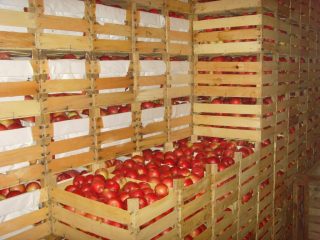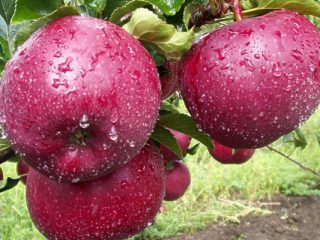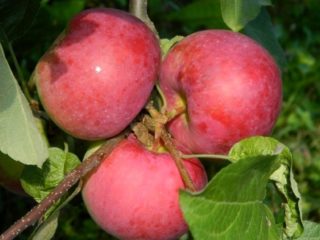Content
The Malinovka apple variety is a common representative of the Pink family in horticulture, which has been popular for a long time. The tree belongs to the types of summer ripening. The variety has several subspecies.
Breeding history
The variety is usually referred to as old. Malinovka apple trees were found on the territory of modern Estonia, in a place called Suslepa. Information about them dates back to the 18th century.
The first description of the variety was made by the French pomologist Leroy. There are several theories that have not been confirmed that the Malinovka apple tree was bred in France. Other sources consider Persia as its homeland.
Description of the apple variety Malinovka with photo
There is no exact data on whether the tree is a hybrid or the variety was obtained naturally through pollination. Before purchasing an apple tree seedling, you should study its characteristics in order to provide the tree with optimal conditions.
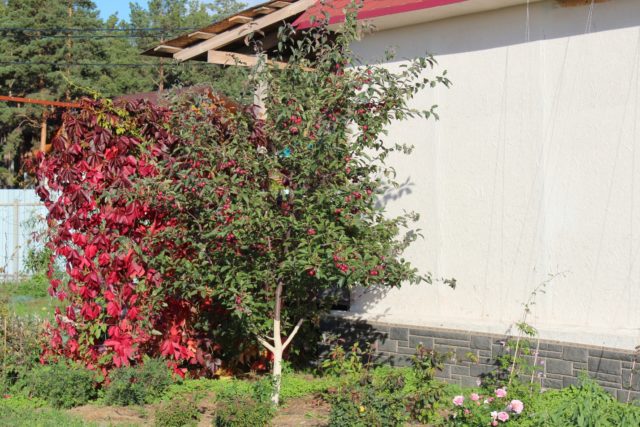
Often the Suislepskoye variety is planted for the purpose of harvesting, although it has varieties that have decorative properties.
Fruit and tree appearance
The variety is characterized by an average rate of development: during its life it does not grow above 3-5 m. The height depends on climatic conditions: in the southern regions, apple trees are more massive.
The crown is in the form of a ball, the width varies from 3.5 to 4 m. Branches are dark in color, raised up. All shoots of the Robinovka apple tree are strong, with moderate pile and medium-sized leaf plates. Their color is deep green. The surface of each sheet is glossy, slightly wrinkled and has fluff. Serrated along the edges of the leaf blades, and a short petiole at the base.
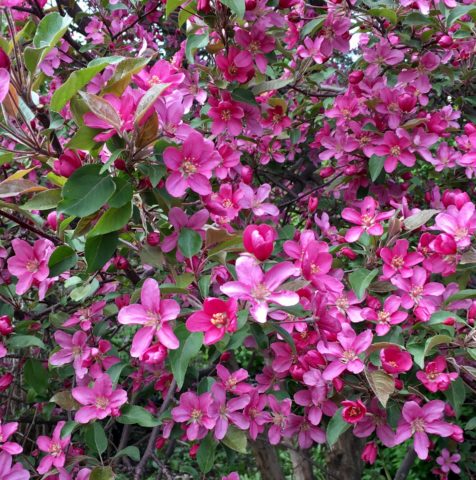
Flowering begins at the end of May: many white-pink buds are formed on the shoots
Description of the variety of apples Robinovka: fruits of medium size, the weight of each of them varies from 80 to 160 g. From photos and reviews it is known that gardeners are faced with a variety of harvests, both large and small fruits are formed on the same tree.
All apples initially have a greenish tint, which gradually changes to yellow. Ripe fruits are covered with bright red stripes of pink tone, like a barcode.
The peel of apples The robin is thin, with a slight bloom of wax. Under it you can see dots of greenish color. Inside the flesh is a snow-white shade. A pink undertone can be seen just under the skin.
Pulp with fine-grained inclusions. The seed chambers are medium in size, flat, and brown in color.
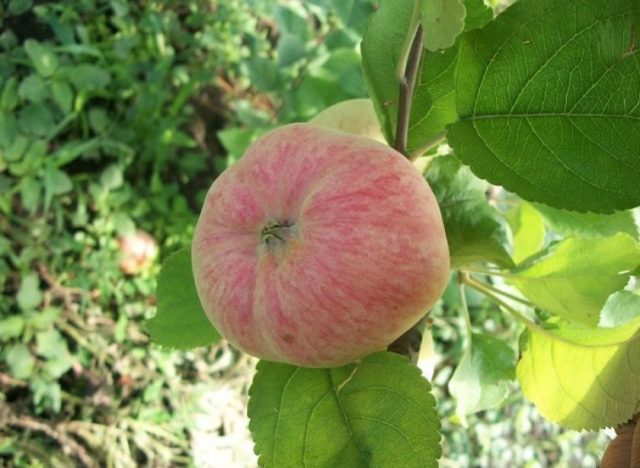
Outwardly, Robin apples resemble a slightly flattened ball with a slight ribbing
Taste
The content of various substances in apples:
- titratable acid - up to 0.7%;
- sugar - up to 9.8%
- pectin - up to 12.2%
- ascorbic acid - up to 9.2 mg per 100 g;
- P-reactive substances - up to 116 mg per 100 g.
Most people consider the taste of apples to be harmonious, juicy, with a pronounced sourness of the pulp, leaving a sweet aftertaste.
Life span
With good care, the Malinovka apple tree remains viable for 35-40 years.Terms vary, taking into account climatic characteristics, care, past diseases.
Growing regions
And although the Malinovka variety is ubiquitous, the peculiarities of caring for it vary depending on the region.
The variety grows well in the Leningrad and Moscow regions, central Russia, Belarus and the North-West region.
In countries with a cold climate, the Suislepskoe apple tree needs shelter for the winter, is cultivated for the purpose of harvesting. In central Russia, the Malinovka variety is often found as a decoration in landscape design. The climate in Belarus and the area where the variety was obtained are similar, so there the tree can be grown without any special agricultural techniques.
Yield
The Malinovka variety is not a record holder in terms of productivity. Up to 50 kg of fruits are harvested from one tree. Young trees delight with apples every year, but as they mature, fruiting becomes less frequent.
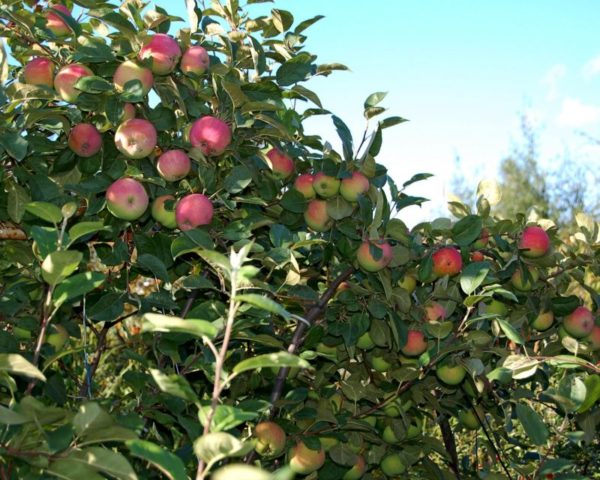
Under favorable weather conditions and good care, a record number of apples can be harvested: up to 80 kg per tree
Frost resistant
Apple-tree Robinovka tolerates low temperatures well. The tree remains viable in frosts above -30 ° C. An apple tree grows and bears fruit worse if the temperature is above + 40 ° C in summer.
Disease and pest resistance
The immunity of the Malinovka variety depends on weather conditions; in regions with frequent precipitation, scab, powdery mildew or rot is possible.
Of the pests, green aphids and leafworms are dangerous for the apple tree.
Scab is easy to identify: spots appear on the leaf plates and fruits, which darken and crack over time. At first, the disease affects the young leaves of the apple tree, but gradually spreads throughout the tree.
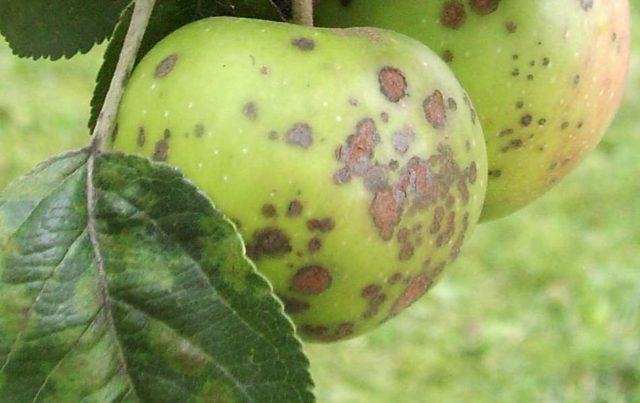
Fruits fall off when damaged by scab, leaves curl and dry out
Powdery mildew can cause serious damage not only to the crop, but also to the tree itself; it affects shoots, flowers, and leaves. If the disease appears during the ripening period, the apples will also be affected.
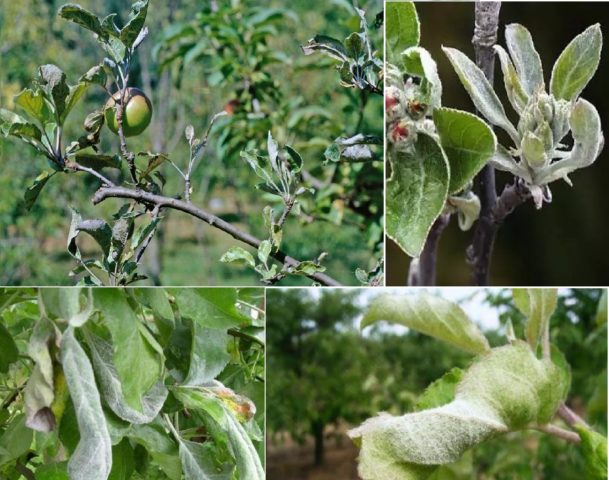
The affected parts of the Robin apple tree are covered with a white bloom, the leaves curl, the flowers are deformed
You can suspect fruit rot on the Malinovka variety even in winter and spring, there are longitudinal cracks with ulcers on the trunk, and the skin of young trees peels off.
Vivid signs of rot are visible during the ripening period, apples deteriorate right on the branches. Their skin becomes covered with yellowish or white spots that quickly spread throughout the fruit. The pulp gradually turns brown, softens and smells like alcohol.
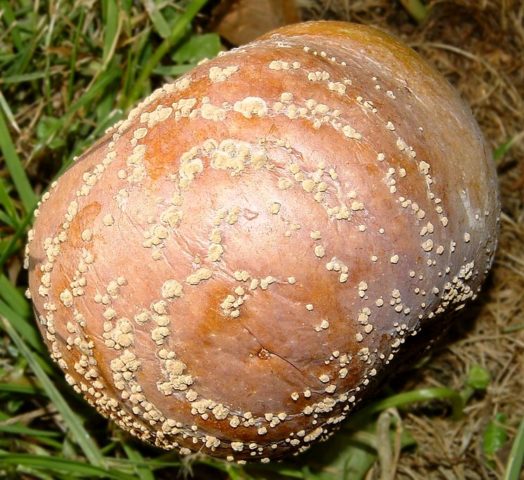
The final stage of rot is the appearance of concentric circles of fungal spores.
Flowering period and ripening period
The buds appear on the tree in the third week of May and later. And although the first Malinovka apples can be tasted as early as 3 years after planting, full-fledged fruiting begins at the 8-10th year of the variety's life.
In some regions, depending on the subspecies, apples begin to ripen as early as June. Most gardeners harvest in July and August.
Pollinators
Apple tree Robin is self-fertile, in order to get a harvest, you need to plant other varieties next to it. The optimal pollinators, whose flowering period coincides with the Suislepskoe variety, are Grushovka Moskovskaya, Papirovka and Makintosh.
Transportation and keeping quality
The peel of apples The robin is very delicate, easily damaged. This negatively affects their transportability and keeping quality. Even under favorable conditions, the preservation of the fruit does not exceed 3 weeks.
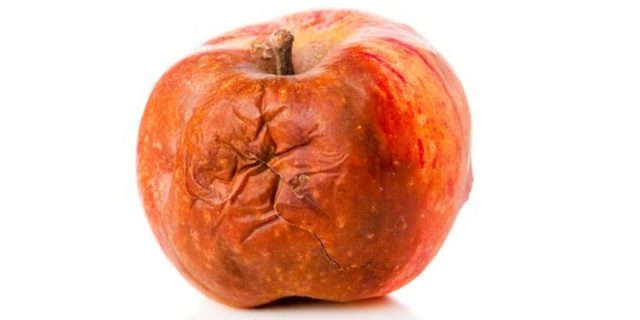
Often in places where the skin is damaged, the pulp quickly darkens and acquires an unpleasant odor, which makes the apple unsuitable for consumption.
Subspecies
Apple-tree Robinovka is not one variety. There are several subspecies that have distinctive features.When choosing a seedling, it is recommended to take this feature into account.
Decorative
The subspecies is usually referred to as tall trees. According to photos and reviews, the Malinovka apple tree can reach 7-8 m in height. Description of the crown: oval or pyramidal, you can artificially transform it into a "palmette" using pruning.
Dark green, glossy leaf plates are attached to the shoots. The flowers of the decorative subspecies of the Robinovka apple are bright pink, multi-layered. Their size reaches 3-5 cm in diameter.
Fruits are small, oval-oblong, purple in color. Their taste is tart, sour.
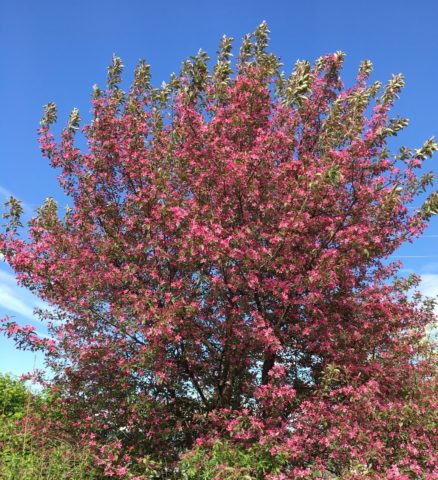
During flowering, the buds cover the entire tree and exude a powerful aroma, attracting insects
Columnar
The apple tree is grown using a columnar stock. For this, one central trunk is left without side shoots. This feature gives an advantage when harvesting and makes maintenance easier.
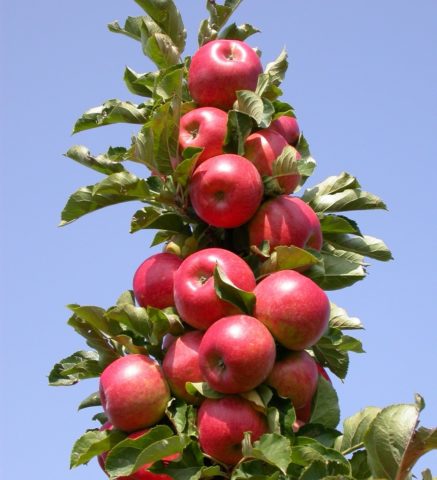
The height of the columnar variety Malinovka does not exceed 2-3 m
Riga
The variety has a strong immune system and is grown on a dwarf rootstock. Riga Malinovka tolerates frost well, grows no more than 3 m in height.
The apples of the variety are small or medium in size, bright red in color, the pulp is white inside, but it has streaks of red, which gives it a pinkish appearance. Ripe fruits tolerate transportation well, are sweet, well suited for jam and compotes.
The first apples ripen by mid-September, but do not fall off, remaining on the branches until frost.
Red-leaved
A distinctive feature of this subspecies is the unusual, carmine-colored leaves. The tree is unpretentious, successfully resists many diseases and pests.
Gardeners often purchase a variety for decorative purposes: the fruits of the apple tree are small, sour, and astringent.
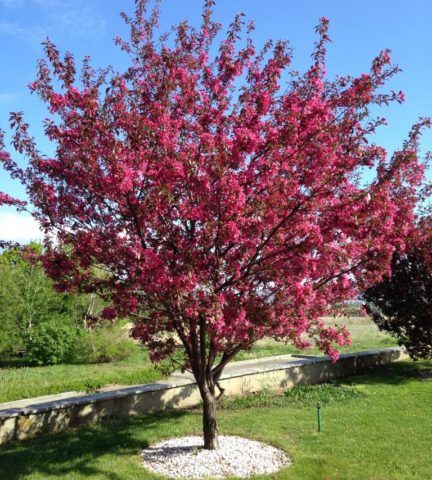
And although the fruits are edible, their taste does not attract gardeners, so the harvest is simply disposed of.
Advantages and disadvantages
The advantages of the variety include:
- the external attractiveness of the fruits;
- pleasant sweet and sour taste of apples.
The disadvantages of the Malinovka apple tree include:
- poor keeping quality and transportability of fruits;
- average yield level.
Most gardeners prefer the Malinovka apple tree as a proven old variety.
Planting and leaving
The place for the Malinovka variety should be well lit by the sun. Abundant fruiting is possible if the land is fertile and groundwater is located far from the soil surface.
If the seedling has an open root system, then it is recommended to transfer them to open ground in the spring, in March or April. A seedling with protected roots can also be planted in the fall, in September or October, but before the onset of frost.
Landing technology:
- 3 weeks before the procedure, a pit is prepared, keeping a distance of 4 m between the seedlings;
- sand and crushed stone are laid at the bottom of the pit as drainage, a layer of fertile soil is distributed, a stake is driven in in the middle;
- the tree is placed in a hole, the roots are straightened, covered with earth and a near-trunk circle is formed;
- abundantly water the Robinovka apple tree and mulch the earth around it.
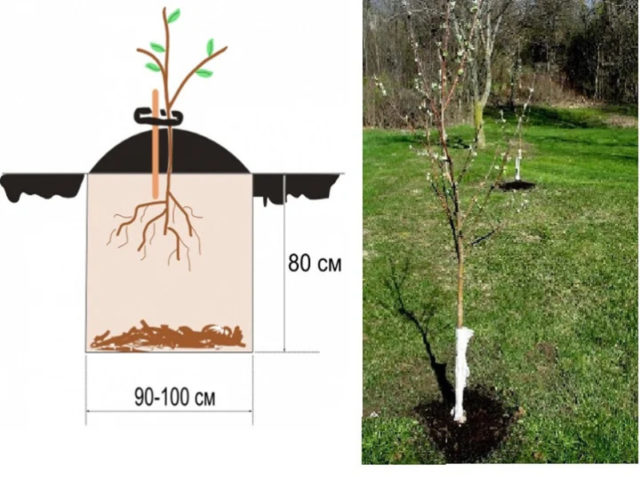
The stake provides support for the seedling, which can easily break under the influence of natural disasters
Care for the Suislepskoye variety is standard: spring pruning, preventive treatment against pests, watering and feeding, preparation for winter.
Under normal weather conditions, watering the apple tree is not required. In dry periods, the soil should be moistened: at least 20-40 liters per tree.
The Suislepskoye variety is prone to thickening, so pruning should not be neglected. Skeletal branches should be spaced apart.
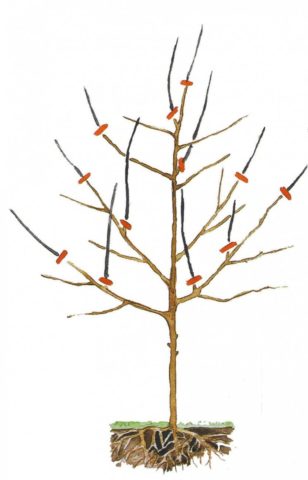
During the formative pruning, sanitary is also carried out: damaged or dried shoots are removed
Collection and storage
Apples do not ripen at the same time, they are prone to shedding, therefore it is recommended to process the crop immediately after harvest.
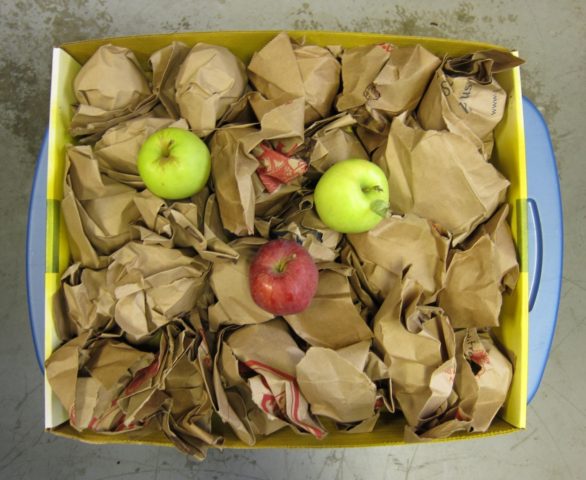
The skin of the fruit is very delicate, easily damaged, so it is recommended to put them in wooden boxes with layers of paper or straw
Conclusion
The Malinovka apple variety is an old but popular culture loved by gardeners. She has very beautiful fruits, the tree itself is unpretentious and frost-resistant. The crop is recommended to be processed immediately, it is not subject to storage and transportation.
Testimonials
